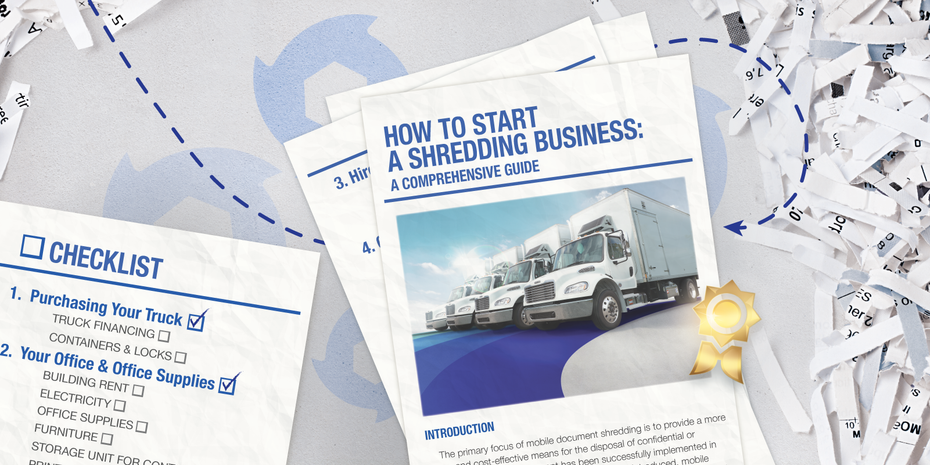The primary focus of mobile document shredding is to provide a more secure and cost-effective means for the disposal of confidential or sensitive materials. The concept has been successfully implemented in many North American and European cities. Once introduced, mobile document shredding often becomes the customer’s preferred method of confidential record disposal.
Most ID Theft crimes are the result of information stolen from a single improperly handled document containing personal information. Although the Internet has gotten a bad rap for security deficiencies, a study commissioned by the Federal Trade Commission, echoes that personal data is usually stolen in offline ways – such as dumpster diving – with only about 12% of the cases being a result of the Internet.
This negligent mishandling of 'waste' documents has forced the enactment of laws designed to protect the privacy of businesses and individuals.
Confidential document destruction is a legislative-driven business designed to protect consumer information. With increased litigation and concern over Identity Theft, many companies are being forced by law to develop strict record management practices. To manage its records properly, a company must ensure secure disposal of its confidential and sensitive documents. The great promise of the Information Age also raises new challenges and opportunities for ensuring effective privacy protections.
Consumer and corporate information are accessible for accidental or intentional viewing if not handled properly. Information such as payroll, personnel, accounting, insurance, etc., must be secured internally as well. By placing confidential documents into a secured container, the information is protected from internal unauthorized viewing until it is destroyed.
On-site shredding offers clients the peace-of-mind of knowing sensitive information has been destroyed in their presence. In addition to the security and cost benefits this service offers, it helps companies meet their goals regarding environmental sustainability. As more companies launch green initiatives, properly handling documents in a responsible manner is becoming more critical.
Although claiming to be secure processes, off-site shredding and recycling services provide ample opportunity for unauthorized retrieval of sensitive information. Recyclers are more concerned with the grading of the paper than the security of the information it contains. Employees hired to sort material for recycling purposes only are usually low skilled and are rarely bonded.
On-site shredding assures that sensitive documents are destroyed before the recycling process begins. The shredded material is compacted and mixed with other data, making it virtually unidentifiable. The combination of security containers and on-site shredding provides an unbroken chain of custody until the material is destroyed.
A summary of the service is as follows:
• Locked security containers are placed in client’s facility.
• Following a pre-determined schedule, the mobile document shredding vehicle arrives to service the containers.
• A bonded, uniformed operator transports the containers to the vehicle.
• The container is placed into the bin lift device, where it is quickly and securely lifted, and tipped into the shredding system.
• The material is destroyed in a matter of minutes. The operator provides the client with a Certificate of Destruction before leaving the facility.
Clients may also store their material in their own boxes until they decide it must be destroyed. In that case, the operator simply empties the contents of the boxes into a container and proceeds as described above.
The proven technology of low-speed, high-torque shear shredding provides for high-volume destruction of confidential material without requiring the separation of binders, staples, paper clips, etc. Although paper is the most frequently shredded material, mobile document shredding services have also been called upon to destroy off-spec consumer products (to avoid the possibility of resurfacing on the black market), confiscated contraband, videos, reel-to-reel tapes, and compact discs.
On-site shredding services process in fifteen minutes what a typical office shredder would process in eight hours; therefore, it is usually more cost-effective to contract a shredding service than to perform the task internally. Not only do the clients usually recognize a cost savings of over 25% over in-house shredding operations, but also their employees can perform other tasks that are more productive.
So how do you get started? And what goes into starting a shredding business? Below is a detailed guide on everything you need to get set up.
1. Purchase Your Truck and Containers
• TRUCK FINANCING: Assuming you don’t have the capital to make the equipment purchase you will need to gather the names of leasing companies familiar with the equipment to assist you with your financing, or you may contact your lending institution for information on down payments and monthly payments. Alternatively, Shred-Tech® has partnered with leading financial service companies to deliver prompt, knowledgeable, and flexible solutions for your equipment financing demands.
• CONTAINERS AND LOCKS: Obtain quotes from suppliers and estimated delivery times. Always keep several containers of each size in stock. You will also need to stock enough locks as needed for new containers and replacement locks.
2. Purchase an Office and Office Supplies
• BUILDING RENT: If leasing, consider limiting the term of your lease, as it is possible that you will outgrow your space in that time. Longer leases are acceptable, provided you negotiate the right to move out prior to the lease end if you need a larger space.
• ELECTRICITY: Contact your local utility company for rates, deposits, and installation schedules.
• OFFICE SUPPLIES: Set up an account with a local office supply company. You will want to have extra copier/printer cartridges on hand and an ample supply of standard office supplies for efficient operation.
• FURNITURE: You should furnish your office to make the work area as efficient as possible. Proper file storage, sufficient work surface and equipment placement should be considered when furnishing your business. You may want to consider pricing used or rental furniture.
• STORAGE UNIT FOR CONTAINERS: If you do not rent an office with sufficient warehouse space, you will need a storage unit close by for container inventory.
• PRINTER/COPIER: Computer printers and copiers are vital pieces of equipment in daily operations. Consider the number of sheets printed per minute, color or black and white, laser or inkjet, as these preferences will determine the cost of the equipment. Opt for the higher end equipment, if possible, in anticipation of accelerated growth-rate.
• PHONE EQUIPMENT/INSTALLATION: Be sure you have sufficient telephone line service to cover the phones (preferably 2 lines), fax and internet service. Usually, there is a one-time installation fee per line and a monthly service fee.
• CELL PHONES/RADIOS: It is imperative that you be able to contact your operators and vice-versa while they are on the job. Consider cell phones or radios for each driver and a base station unit.
• TELEPHONE AND INTERNET PROVIDER: Contract with a local and long-distance service carrier. Contact local providers to find out if DSL is available in your area. DSL is a high-speed, dedicated connection to the Internet. Web pages come up instantly and e-mail and attachments download quickly. Should you decide to set up and maintain your own website, DSL will save you a considerable amount of time. Cable modem is also sufficient but is noticeably slower.
• COMPUTER SETUP AND SUPPORT: You may need assistance with networking your computer systems and/or installation of software. These services are usually charged by the hour. Ask business associates for referrals, if needed.
• COMPUTER(S) WITH OFFICE PRO: Provide your computer supplier with as much information you have on the programs you will be running on your computer system. If you start out with an insufficient system, you will have to upgrade your system as you grow. You should have Word and Excel, as well as PowerPoint for sales presentations.
• ACCOUNTING, SCHEDULING AND CONTACT MANAGER SOFTWARE: We recommend QuickBooks accounting software, but you will want to consult with your accountant before making your purchase. QuickBooks is available at most office supply or computer stores.
• Routing and servicing can be maintained in scheduling packages such as Microsoft Outlook and MS Scheduler.
There are several excellent contact management software packages available, including ACT! and Maximizer. Consider and compare the benefits of each carefully, as your database will become the core of your marketing and sales strategy and information. Visit http://www.multiactive.com/smbiz/maximizer/ for more information on Maximizer products and services. ACT! can usually be found in your local office supply or computer store.
• DATABASE: You will be constantly building a prospect database through a motivated sales staff, but you should purchase a database for your startup. Check your local Yellow Pages under “Mailing Lists” or call Database America (800-551-1533). Other suppliers are American Business Information (800-336-8349) and Experian (888-329-0707). You will also want to use the membership lists from the associations you have joined.
• WORK ORDER PRINTING: Depending on your method of accounting and billing, you may need to order Work Order books (printed with corporate heading), or you may print out work orders with your accounting or scheduling package. A work order should be left with each customer or department (depending on customer preference) following service, so order accordingly.
3. Hire Staff
• SALES STAFF SALARIES: Your overall marketing program will determine the number of outside sales people you hire.
• SALES COMMISSIONS: Some employers pay sales commissions on a one-time only basis at the time of container placement or on completion of a purge. Others pay a commission on each month’s container service for a period of up to two years. You decide which option works better for your situation.
• TELEMARKETING SALARY: This is an optional inside sales position scheduling appointments for the sales staff.
• ADMINISTRATIVE SALARY: Salaried employee for administrative duties such as accounting, billing, scheduling, etc.
• TEMPORARY EMPLOYEE SALARY: Oftentimes an operator will need assistance with larger purges for maximum efficiency. This position is usually a minimum wage salary or slightly above.
• OPERATOR (DRIVER) SALARY: The equipment operator will be responsible for the daily routine maintenance and care of the vehicle, along with gathering paper and shredder operation. Keep in mind that this person will be making regular contact with your customers, so he/she should also possess good people skills.
4. Organize Insurance and Fees
• VEHICLE INSURANCE: Consult your insurance agent and lien holder to determine specific insurance requirements for liability and property value.
• WORKER’S COMPENSATION INSURANCE: Contact your insurance agent for information on worker’s compensation rates and requirements in your state.
• PROPERTY INSURANCE: Contact your insurance agent for replacement value insurance rates on containers and office property.
• HEALTH INSURANCE: Contact a local insurance agent for programs and rates available for your company.
• PROFESSIONAL FEES: You will incur attorney fees and accounting fees, especially in the start-up phase. Obtain an estimate on recurring fees throughout the year for any professional services rendered.
• ASSOCIATION FEES: Membership in associations such as local Chambers of Commerce, NAID, ARMA, etc., shows your interest in and commitment to industry excellence and local business support. Many of these associations also provide membership lists which are valuable sources of prospect databases.
5. Have a Marketing Plan
• ADVERTISING/WEBSITE: Select your advertising media and obtain quotes. Many of them will assist you with your display or advertisement, or you may wish to use a marketing agent. Obtain quotes for website design and management.
• CORPORATE BROCHURES: Your marketing agent will be able to provide costs for development, layout and design, and printing of corporate brochures. You will want your printed materials (letterhead, envelopes, business cards, presentation folders, container stickers) consistent with your corporate brochure design and logo. Quantities will depend on your overall marketing plan.
• QUARTERLY NEWSLETTERS: An excellent way to keep in touch with your prospects and customers is with regularly scheduled mailings such as newsletters. You can develop and print them yourself or contract them out.
•ADVERTISING MATERIAL: Promotional materials such as engraved pens, cups, key holders, etc., are excellent means of advertising. Many conference attendees take these materials, therefore having a constant reminder of your services. They are also good for new customer and customer relations gifts.
• TRUCK LETTERING: Pricing will depend on your logo, including size and colors. Vehicles are usually lettered in vinyl rather than paint. Contact a vinyl sign company for an estimate.
• UNIFORMS/ID BADGES: Obtain quotes from several uniform suppliers for monogrammed uniforms. Local sign or addressing equipment vendors should be able to provide quotes for photo ID security badges.
6. Vehicle Up-Keep
• LICENSING/PERMITS: Contact your local sales tax office for information and fees for required licenses and permits for operation.
• VEHICLE REGISTRATION: Contact your local DMV for information and rates on vehicle registration.
• VEHICLE MAINTENANCE: Keep some supplies on hand for routine daily shredder maintenance, such as grease and hydraulic oil. Routine vehicle maintenance should be followed according to manufacturer’s instructions.
• FUEL: Gas prices will vary in different areas of the country, but you can calculate 3.5 gallons of fuel/hour for majority of the Shred-Tech MDS Models, and 6.5 gallons/hour for the MDX-Line, under normal driving and shredder operating conditions.
Now it may seem like there’s a lot of things to consider when starting a shredding business, however, there are a lot of advantages to starting a career in this industry. The expected compound annual growth rate according to Grand View Research is 7.8% from 2019-2025. Therefore, not only is it a steady revenue stream but it is an industry that will continuously be relevant. .
For further guidance on getting started with your very own shredding business, we’ve also provided information to help you along with our “Start a Shredding Business” page, which details everything from benefits of starting your business to starting in the industry and even legislation considerations. For even more information or if you have any questions, don’t hesitate to contact a Shred-Tech® expert today! Our team is on standby 24/7 to help you realize your success.
 US Dollars
US Dollars





